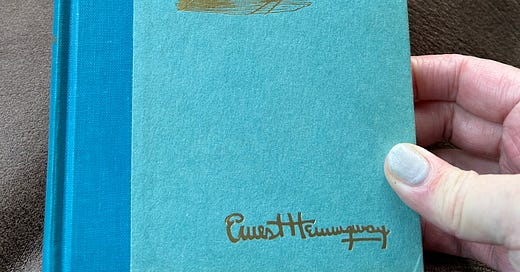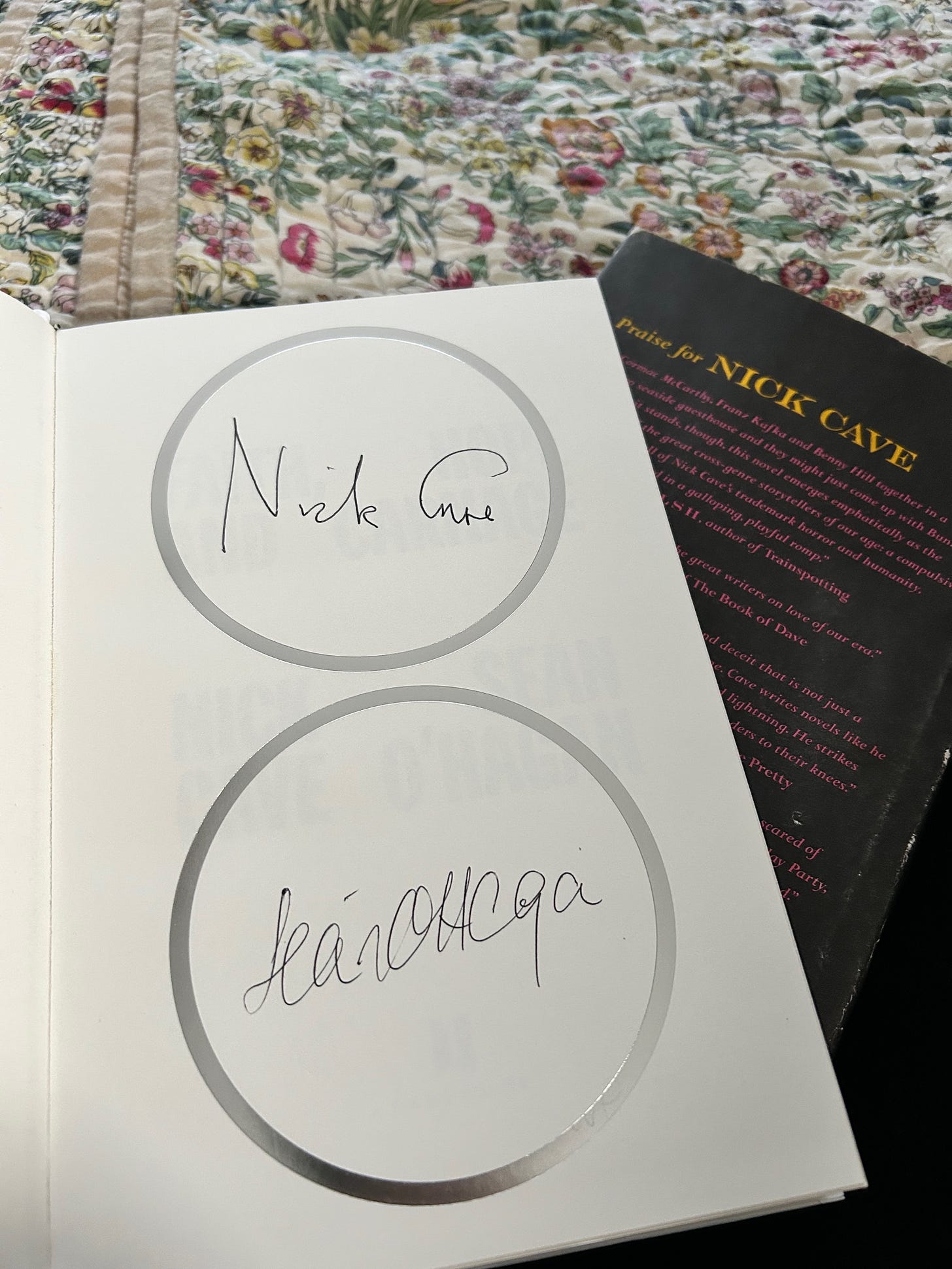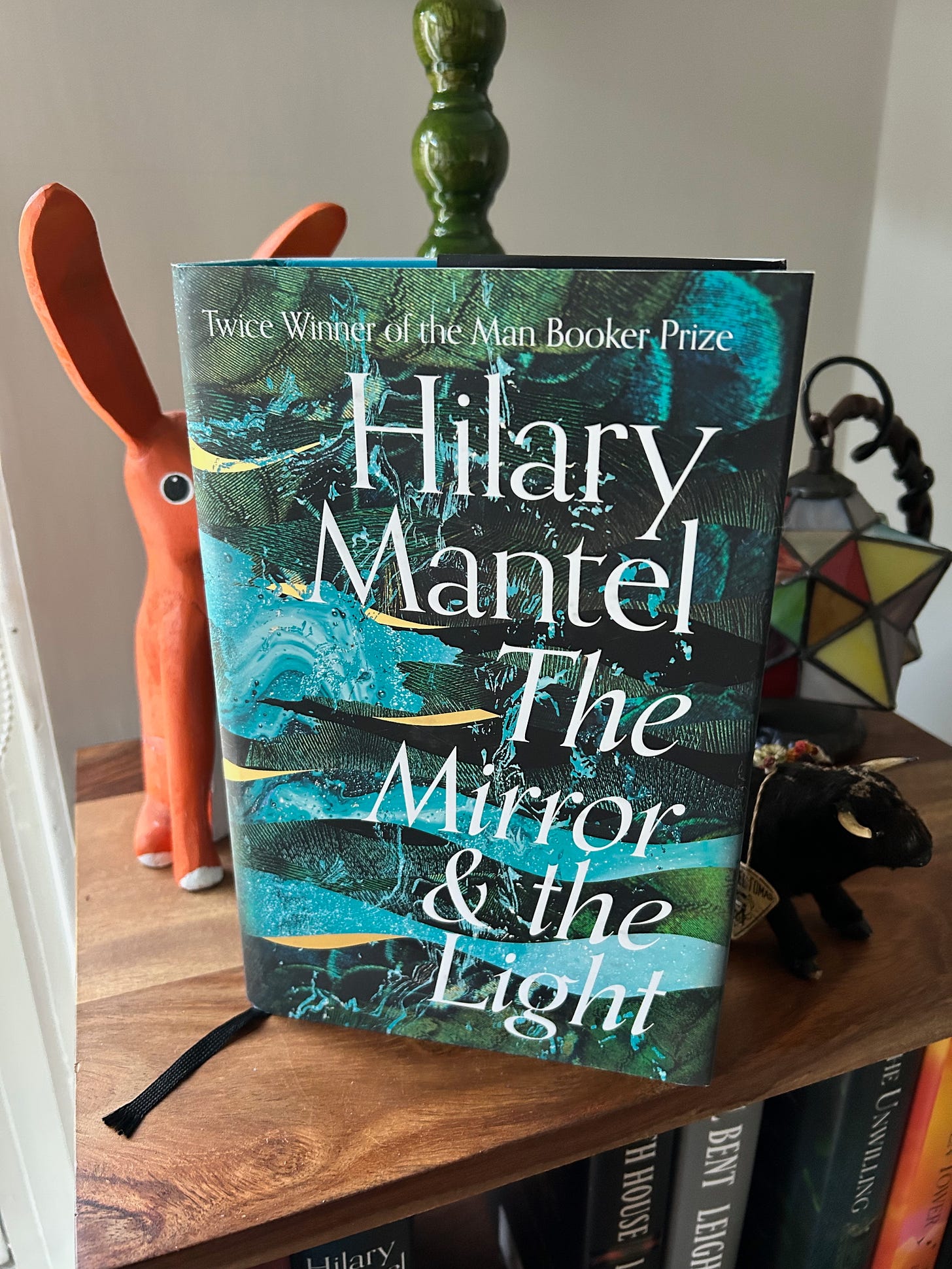COLUMN: The Book-Object, "Books I Keep Though I Haven’t Read Them"
Elinor Abbott on books in her collection that have a hold on her despite never having cracked the cover
I wanted to further explore an idea I briefly touched on in my last column about the materiality of books, which is the connection that forms between physical object and personal memory. In terms of books, a book you read during a particular period of your life might attach you to who you were at that time, and how the ideas in the book changed you, or affected you. But why might we hold on to books that we’ve never read and that we might not really have any intention of ever reading? I have plenty of books like this in my own library and thought I’d take a closer look at a handful of them. What I discovered is that books serve as a collection in the same way any group of objects might, such as a collection of porcelain figurines. Though books are special in that they are objects through which knowledge and ideas can be transmitted, they are still objects just the same. And we use collections of objects to narrate ourselves— be it in terms of our memories, taste, interest or all of the above. We can love or attach to a book, not for its story or message, but for how it came into our life and what that tells us about who we are. Below are my relationships to eight unread books and how they serve as tokens of memory, my relationships to others, identity signalling, fandom, memorial and collecting.
The Old Man and The Sea by Ernest Hemingway
While I love Hemingway, this is a book of his I have never been able to tackle, men and their relationship to the sea being something I have almost zero interest in. Interwar Paris? Sign me up. A boat? No thank you. This book sits firmly for me in the aspirational/completist area of my life as a young reader, where I felt that it was, for some reason, important to try and read everything by a writer I loved. This copy of The Old Man and The Sea was filched from my childhood home, as my father has inscribed the inside of the book as a gift to and from himself, dated November 5th, 1982. It also says, in different handwriting, “A. Abbott, EN Honse. Rol. 6L.” on the inside flap, which is a mystery to me. I am guessing it could have been that my sister took this copy to read for school? She and my father share initials. This printing is from 1952 and was on sale for $1.53. The dust jacket is blue with brown water marks, perhaps stained by coffee? and features a dramatically leaping fish. I think this is supposed to speak to adventure but only makes me think about how little I ever want to go fishing. The book underneath the jacket is pristine with a golden fish and a golden print of Hemingway’s signature.
I also have a copy of The Sun Also Rises and A Moveable Feast stolen from my family library, but those are battered with the love of me having actually read them. My Uncle Malcom, a fellow writer and person whose reading/writing advice I maybe took too seriously when young, told me once he never read The Old Man and The Sea because anything Hemingway wrote after his editor Max Perkins died made him want to “throw up.” I don’t know much about Max Perkins but wonder if this pronouncement gave me pause. Yet, I have hauled this book around with me, in its stained jacket, across two continents and the American West, Midwest and East Coast, packed it in and out of more boxes than I can count, assuming, I guess, that one day I would get around to it.
The Whistling by Rebecca Netley
I bought this at a bookstore in a seaside village I was visiting while trying to save a relationship that was not possible to save. I ran into the bookstore to get out of the lashing rain a gale had suddenly blown into town. I spent over an hour in there, waiting out the storm. It was dreamy, just what you want a bookstore to be, the light honey-toned and the sound of rain hitting the windows, every inch of the shop stuffed with books and puzzles and toys and journals. I picked through it all deliciously, building a pile in my arms that was not realistic to haul around with me on vacation. I felt cozy and safe; the great dissolution consuming my life couldn’t touch me in there. Eventually I narrowed it down to this single gothic novel in hardback with a beautiful cover-- black except for a lantern flame, the name of the book in gold lettering. I put it in my suitcase.
Later, I got rid of everything I possibly could that reminded me of that relationship, except this book, which I never opened even once. I display it on my bookshelf and look at its spine often. Why? I know now that trip was a memorial in a hotel room, but at the time I thought I could still pull the nose up, not just save it, but turn it all around — that it would be my big miracle. A gothic novel is often one of menacing surroundings, a manor, a landscape, all alien and against the heroine—something bad in its unknown past is coming to get her, she tries to believe her way out of it, but is eventually enveloped by it. Some things are so hard to let go of—your innocent self, fighting, trying, but eventually fading away into the you of now, who no longer believes. Maybe The Whistling is like a piece of Victorian mourning jewelry, but instead of a locket with a piece of hair, I have this book to remind me of those last sour moments I had being this hopeful but painfully naive person.
Faith, Hope and Carnage & The Death of Bunny Munro by Nick Cave
It’s well known in my circles that I am a big fan of musician Nick Cave. Before streaming took over, collecting the albums of his various musical ventures one by one, and treasuring each like a gold coin inside my flippable CD holder, was a particular pleasure. I am also a fan of his writing, and perhaps a fan of his writing first and foremost, as it was the lyricism of Murder Ballads that originally drew me in. His 1989 gothic fever-dream novel, And the Ass Saw the Angel, was a favorite book for a long time. However when my Uncle Malcom gifted me a copy of his 2009 novel The Death of Bunny Munro, I hesitated—though I found the gift very considerate of my interests. Bunny was written at the height of Cave’s mustachioed horny old man period and at the moment of this gift, I was winding my way toward divorce, and the extremities of maleness were beginning to grate on me. I didn’t know if I could sit with 278 pages of it, and still do not know if I can, housed as the novel is in hot pink hardcover, a defiant rabbit sticking a pink tongue out at me from the jacket.
Faith, Hope and Carnage is a conversation between Cave and journalist Seán O’Hagan that came out during the pandemic. Cave had been discussing it in his newsletter, The Red Hand Files, and it sounded interesting. An email from Waterstones enticed me to preorder a signed copy, but when I got the book something about it being signed made me feel sad, still makes me feel sad as I sit here and look at it. I think I feel lame for being tempted by this signature, for wanting a signature of someone I admire, as if that connects me in some way to this person when of course it does no such thing. It was not even a signature I asked for in real life and can attach to a memory, but one that was manufactured by a distant agreement with a chain bookstore. I’ve come to concur with the old adage that warns you never to meet your heroes— I don’t want the joy and inspiration I receive from art to be disrupted by potential “off vibes” that might occur between any two people. But this mute and static signature makes me feel lonely. I’ve been so affected by a person who will never know me. The signature heightens for me the thingness of the book itself, the thingness of all the pieces I own of Nick Cave’s work, which are not the beautiful, ineffable moment a sound filled an empty hall but are a mass produced record of it. Other books I own of his are a one-way transmission from his mind to the minds of many through a process of mechanization, though I may experience it as personal, it isn’t. It’s miraculous, this mass communication, but it also makes me feel like I am stranded somewhere barren with no one to talk to. I think about selling this book sometimes.
The Eyre Affair by Jasper Fforde & Napoleon by Vincent Cronin
My friend Joni died just over ten years ago now and I don’t often hear people talk about being angry at the stupidity of death, but death is something that never fails to enrage me. If Joni were here, she would have loved and been furious and laughed and made things. The world would be richer for her eye, for her sarcasm, for her wit. Whenever I realize I can’t share something with her that I know she would have loved, I feel like I want to punch the world in the mouth. I didn’t know how close she was to dying, I didn’t understand what the intricacies of her cancer meant, or maybe I didn’t want to know. There’s a lot I regret. I used to work for her sometimes, she owned a candy store, a beautiful little pastel terrarium of a place, and one of the last times I saw her, she brought into the shop these two books for me. The Eyre Affair was one of her favorite books of all time, and she felt Vincent Cronin had written the definitive Napoleon biography. She loved Big Moments in history-- Marie Anotinette, the Russian revolution, Napoleon and the like. I thought that she was lending them to me out of the blue, because she knew I loved to read and then we could talk about them. It was later I realized that she was giving me something of hers to keep for when she was gone. I tried once to read The Eyre Affair and closed it after a few pages--it made me want to talk to Joni. Napoleon, I have never attempted. I fear as well that I might dislike the books, and I couldn’t bear to dislike them. Joni would probably think it was crazy I hadn’t ever even tried to read them. But that’s ok. They’re my everyday vigil to her, sitting on my bookshelf, reminding me of this blazing little bonfire of a person I loved.
The Mirror and The Light by Hilary Mantel
I am a huge Hilary Mantel fan. I considered her our greatest living writer. As acclaimed as she was, I felt she should have been more acclaimed, more celebrated. She wrote with great empathy and zero pity. My favorite of her works are her most famous-- the Thomas Cromwell historical fiction novels, starting with Wolf Hall and followed by Bring Up the Bodies. I have never been able to face The Mirror and The Light, the final in the trilogy. I love Mantel’s Cromwell, he is maybe my favorite character in all of fiction. And because I used to watch an episode of the soapy aughties tv show The Tudors (aka Sexy Tudors) to reward myself after a run, I know how Thomas Cromwell dies. He is killed in such a horrible way, I don’t think I can deal with it. Also it was Mantel’s final book before her death, which somehow makes it worse (we will never get her Mary Bennet book! Sob!). I pre-ordered The Mirror and The Light in 2020 from the incredible American Book Centre in Amsterdam and received it in the mail at the beginning of lockdown. “What a perfect time to sink into a gigantic Mantel book,” I remember thinking, holding its hardcover in my hands, washed in beautiful shades of blue and green. I’ve never even once attempted it. But I have moved it with me to a new country and into two successive flats in the last five years.
The Stones of Summer by Dow Mossman
Mike is one of my oldest friends. I met him while traveling abroad. I was nineteen and he was twenty-nine, and at the time, I thought that meant he was old as the hills and full of worldly knowledge. Now the idea of any twenty-nine year old boy being a sage is legitimately hilarious, Mike or otherwise. But because of the circumstances of our introduction, I have always held Mike in a place of esteem--that he would surely scoff at--but it’s grafted onto him. For many years we would occasionally meet up whenever he happened to be in town. He is a wanderer of this earth and not often in any place for long. We were both unhappy during those years of coffee shop hangs, me trying to elbow my way out of my twenties, him trying to wrestle his own demons. We’d argue about Buddhism, about the purpose of life; he was always trying to get me to soften up a little. We originally connected as depressives who tightrope walk our sadness along a wire of cultural interests, noses in books, headphones over our ears. Our meetups would always involve the exchange of current musical and fictional tastes. I have letters from Mike, mixtapes, maybe like four photographs, and a copy of The Stones of Summer. I had just watched a documentary made about this book called Stone Reader and how it was a book which deeply impacted the people who read it, though it was relatively unknown and its author never wrote another book. When I next saw Mike he had a copy of it for me in his hands as if we shared a psychic link. I think this is another case of the gift of the book is more precious to me than the book itself, and I would rather hold on to the memory of the person giving me the book than develop an opinion about it and have that opinion perhaps eclipse my connection to the memory of someone I love.








Been a fan of Nick Cave since the 80s but have never gotten through any of his books. The whole Red Hand Files business really turned me off too. I don't want to be his friend; I want him to keep being a rock-n-roll vampire, but I get why he no longer can be.